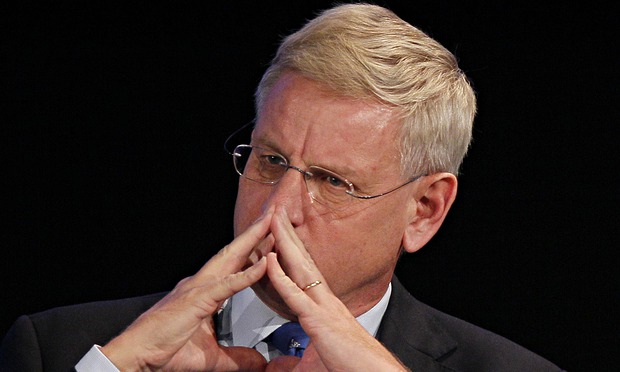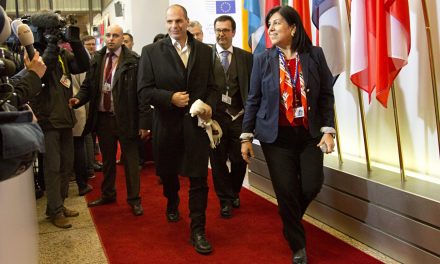Former Swedish PM Carl Bildt warns that appetite for treaty change in EU has diminished since Syriza won the Greek election
The Guardian
David Cameron’s hopes of achieving a “full-on” re-writing of the EU’s governing treaties have suffered a severe blow after the election of the Syriza-led government in Greece, the former Swedish prime minister Carl Bildt has warned.
In a Guardian interview, Bildt said leading eurozone countries would be wary of handing the new Greek prime minister, Alexis Tsipras, and his rightwing coalition partners the chance to press for changes to the rules governing the single currency. Any changes to EU treaties have to be approved by all 28 EU member states.
“Treaty change will be very difficult,” Bildt told the Guardian during a visit to London. “If you open up treaty change you haven’t clue what they [the new Greek government] will put on the table. The appetite for treaty change has diminished even further.”
Bildt, who served as Swedish prime minister between 1991 and 1994 and as foreign minister between 2006 and October last year, issued his warning after Cameron said this month that he would demand “full-on” treaty change if he were to win the general election.
The British prime minister has pledged to hold a referendum by the end of 2017 on revised EU membership terms which he aims to negotiate if he wins in May. He wants to impose restrictions on in-work and out-of-work benefits and to give the UK an opt out of the EU’s founding principle of “ever closer union”.
But Bildt made clear the EU was more concerned about shoring up the single currency and dealing with the new Greek government. Sweden is not a member of the euro, although Bildt, who served as the high representative for Bosnia between 1995 and 1997, is a leading figure in the centre-right pan-EU European People’s Party whose unofficial figurehead is Angela Merkel.
When asked whether he thought Tsipras would reach a deal with Greece’s creditors – the European Central Bank, other eurozone countries and the IMF – Bildt said: “I am not confident at all … I don’t know. It is still too early. We have see what kind of policies the Greek government are going to pursue.”
Bildt was wary of the suggestion by one British government source that a deal would eventually be reached that would see no reduction in Greece’s overall debt but would see an extension of the maturity of its debt. One UK source spoke of extending the maturity of Greek debt “into the Greek calends”, a phrase meaning postponing it indefinitely.
The former Swedish leader thought this was unlikely. He said: “Yes you can do that. But they [the Greeks] are running out of money and they are dependent upon new loans. What they are now saying is that they are going to increase public spending. That means that they will be even more dependent on new loans and more dependent upon the generosity of the other European taxpayers.
“Are the other European taxpayers going to be willing to give even more money to a country that is not going to spend less but is going to spend more? I think that is not entirely likely.”
Speaking earlier at an event organised by the pro-European British Influence group at the Royal United Services Institute, Bildt warned that the new government in Greece would put the brakes on treaty change, which is strongly opposed anyway by France. François Hollande, the French president, believes he would have to hold a referendum on a new treaty, which would hand a political gift to the Front National leader Marine Le Pen.
Germany is keen to underpin new eurozone governance arrangements in a revised Lisbon treaty but accepts that this is all but impossible in the current climate.
Bildt said: “The new [Greek] government is coming from both ends of the political spectrum. If you open up treaty change with them around the table you could have anything. Treaty change is extremely unlikely to happen in the foreseeable future.”
He also warned that the EU and Britain would be diminished if the UK left the EU. “The weight of the EU on the global stage will diminish but the weight of the UK would diminish even more because the UK is important as a significant actor inside the EU. Ask Washington. They would go to Brussels, Berlin, Paris. Americans would still change aircraft at Heathrow but that would be about it. I am exaggerating slightly. But there would be a risk of that.”
Bildt said that negotiating a divorce would be “cumbersome but doable”. But he warned that opponents of the EU, who believe the UK could negotiate a relationship with the EU along the lines of Norway and Switzerland, would turn the UK into a satellite of the EU. Norway has tariff-free access to the EU’s single market as a member of the European Economic Area (EEA). But it has to abide by EU regulations related to the single market “over which Norway has no voting rights”, according to the Open Europe thinktank. Switzerland has negotiated a free trade agreement with the EU.
He said: “If you want to be part of the single market [but not in the EU] you would have to enter what is de facto a satellite relationship with Brussels without any influence on the decision making. Would this be acceptable to the UK parliament? I doubt that. So that means leaving the single market. Then you are really ending up in cold water.”
He added: “Switzerland does not have a good relationship with the EU. The Norwegians do have but it is a satellite relationship. You have to have a national rubber stamping of decisions taken in Brussels over which you have no influence. This is barely acceptable to Norway, it was not acceptable to the Swiss and accordingly the Swiss have gone into these extremely complicated bilateral agreements which you can ask the Swiss don’t really work and exclude them from things that are important.
“The single market is dependent on the common decision making of the rules of the single market. It is defined by the single rules. Those are decided by the Brussels procedures. If you want to be part of the market and outside of Brussels then you end up with a huge democratic deficit.”



















